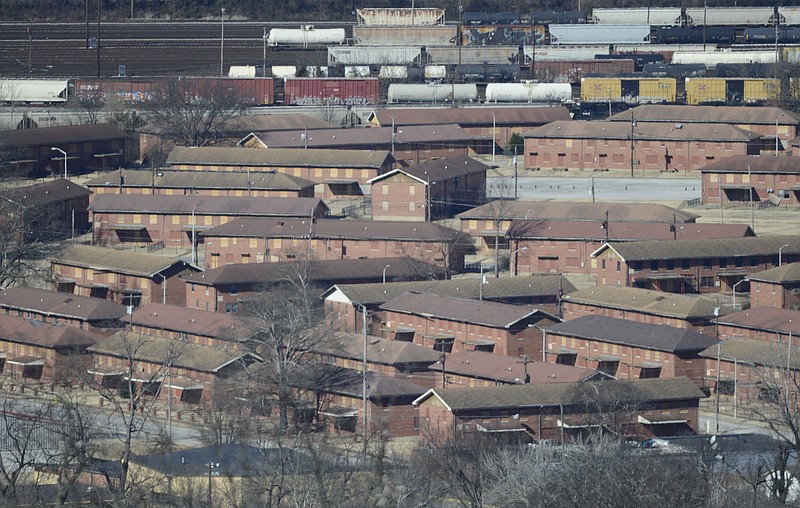Patience is a virtue, goes the maxim. And we're seeing patience have its day this week at what has become known as East Chattanooga's Tubman site.
Nippon Paint, one of the world's biggest automotive paint and coatings companies, announced Monday it will build a $61 million plant on 30 acres of the 45-acre Tubman property which once housed the former Harriet Tubman housing project. Nippon's planned 270,000-square-foot factory will bring 150 jobs over the next five to seven years.
That's a "right fit" for a site where, within a half mile, there still are 663 mostly low-income households. According to 2019 census data, 28.5% of that population does not own a car.
The "right fit" search began shortly after Tubman closed in 2012. The 66-year-old public housing development, once known as Boone-Hysinger Courts, was one of the biggest public housing projects in Chattanooga. More than 400 families were displaced when the Chattanooga Housing Authority closed it and put it up for sale.
When then-new Mayor Andy Berke took office early the next year, the site and its community struggle spoke to him.
"When I became mayor, Tubman had been closed for a year and was vacant and deteriorating," he said. "It was 72 buildings boarded up - staring at a neighborhood telling local residents the government didn't care about them. That was really tragic to me."
East Chattanooga had not had a new manufacturing employer in more than century since the hosiery textile mill that became Buster Brown opened in 1917. Berke balked at the idea of reopening the housing complex with low-income housing owned and operated by what the community feared would be an out-of-state "slumlord." Berke wanted to see the property used for economic development to provide jobs in a part of the city where the jobless and poverty rates are much higher than the rest of the city.
The mayor, who often is quick to say that if fixing a problem was easy, there wouldn't be a problem, leveraged his early political capital to make a determined search for the "right fit" to bring jobs to the too-long-overlooked and under-appreciated community.
The effort hasn't been without its challenges. First Berke had to persuade the City Council to approve the city's purchase of the dilapidated complex for $1 million and spend another $2 million bulldozing it to open it up to one of the nearly 40 employers bidding to open a manufacturing plant.
Then there was the seven-year wait - complete with opposition from the local Unity Group and a citizens watchdog group known as Accountability for Taxpayer Money.
The groups were unhappy with a January council vote to unanimously endorse the rezoning of the former housing site for manufacturing use in order to help recruit new industry. Some wanted the property zoned for mixed use (think gentrification). Others urged the city to require any buyer of the site to sign a community benefits agreement specifying how the local community will gain access to the jobs created by the new plant. Still others - even Monday - criticized the city for not involving the community enough.
But the city says it has listened - at no fewer than 14 meetings. And Chattanooga City Council member Anthony Byrd called Monday's announcement "awesome for our community." Byrd says he's open to having a benefits agreement if the company does not voluntarily employ local residents. But he said Nippon has indicated its desire to hire from the neighborhood "and it is up to us and the community to help identify those individuals who want these jobs and do what we can to help them take advantage of this opportunity."
Ken Smith, president of the Avondale Neighborhood Association, also championed the new investment, which his group has been working to promote since the housing project closed in 2012: "Everybody wanted to see a change come to this community and we sought to see a sustainable investment in this area. Nippon Paint is that sustainable investment in this community, and we'd like to welcome them."
The paint plant will pay an average wage of $22.63 per hour. The pay will range from $13-$31 per hour, with the majority being $16-$22 an hour, Berke said.
Chattanooga, which competed with several other cities to land the facility, will give the property to Nippon, but is not offering tax incentives. Nippon will pay full property taxes on its development, which city officials said will provide more money for local schools and for city efforts to work on the remaining 15 acres of the Tubman site. Nippon also will receive more than $1.1 million in a state Fasttrack grant from the Tennessee Department of Economic and Community Development to assist in construction costs.
Berke said he understands the community's skepticism about government projects and the broken promises in the past.
And though it took seven years, he believes Nippon will reinvigorate the community and complement the city's opening of a new Avondale Youth and Family Development center, the revitalization of the Wilcox tunnel and the new sidewalks along Glass Street.
Patience is a virtue. And East Chattanooga is rising.
